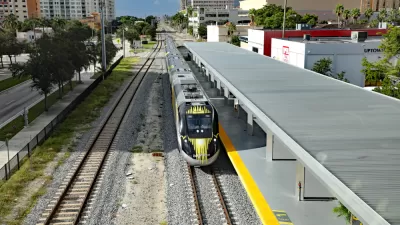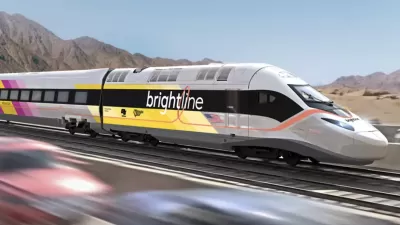On Tuesday, the California High-Speed Rail Authority announced that the cost of the project has tripled to nearly $99 billion, and federal funds for it don't exist yet--prompting some legislators' support to fizzle.
Mike Rosenberg and Steven Harmon elaborate on other figures, either previously overestimated (ridership) and underestimated (fares)--and what other financing schemes the state may look to next:
"The rail authority hopes the federal government will launch a new tax-credit bond program and create grants that would initially provide $30 billion for the project, matched with $11 billion in existing state and federal funds, to build a stretch of track long enough to start service. Those tracks would stretch from the Central Valley to either San Jose or San Fernando Valley, with train service beginning in 2022.
From that point on, the state hopes to make a profit, which officials project will spark $11 billion in private investments, an additional $35 billion in federal grants and $10 billion from various sources such as local governments and private companies."
FULL STORY: More grim news on $99 billion high-speed rail plan, as showdown looms

Maui's Vacation Rental Debate Turns Ugly
Verbal attacks, misinformation campaigns and fistfights plague a high-stakes debate to convert thousands of vacation rentals into long-term housing.

Planetizen Federal Action Tracker
A weekly monitor of how Trump’s orders and actions are impacting planners and planning in America.

In Urban Planning, AI Prompting Could be the New Design Thinking
Creativity has long been key to great urban design. What if we see AI as our new creative partner?

King County Supportive Housing Program Offers Hope for Unhoused Residents
The county is taking a ‘Housing First’ approach that prioritizes getting people into housing, then offering wraparound supportive services.

Researchers Use AI to Get Clearer Picture of US Housing
Analysts are using artificial intelligence to supercharge their research by allowing them to comb through data faster. Though these AI tools can be error prone, they save time and housing researchers are optimistic about the future.

Making Shared Micromobility More Inclusive
Cities and shared mobility system operators can do more to include people with disabilities in planning and operations, per a new report.
Urban Design for Planners 1: Software Tools
This six-course series explores essential urban design concepts using open source software and equips planners with the tools they need to participate fully in the urban design process.
Planning for Universal Design
Learn the tools for implementing Universal Design in planning regulations.
planning NEXT
Appalachian Highlands Housing Partners
Mpact (founded as Rail~Volution)
City of Camden Redevelopment Agency
City of Astoria
City of Portland
City of Laramie




























